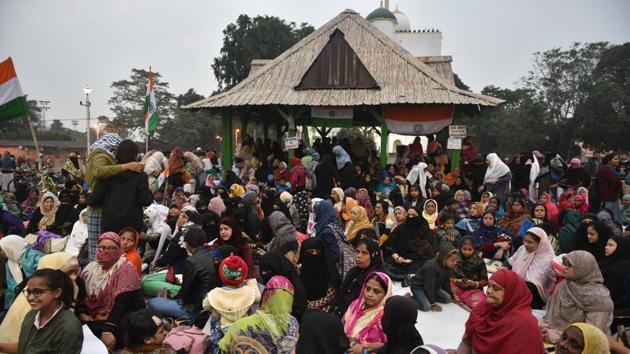On eighth day, Kolkata’s ‘Shaheen Bagh’ agitation is growing
The protest against the CAA and NRC in Park Circus started as an expression of solidarity with the Shaheen Bagh agitation in New Delhi.
The Park Circus Maidan, sprawling over 36,954 square feet in south Kolkata, is turning into Kolkata’s own Shaheen Bagh, with hundreds of Muslims women – from students and homemakers to senior citizens – sitting on an indefinite demonstration and spending the night in the open, protesting the Citizenship Amendment Act (CAA), the proposed National Register of Citizens (NRC) and the National Population Register (NPR).

Their demonstration entered its eighth day on Tuesday, with the crowd steadily growing. While several hundred women stay up at night, the crowd in the evening exceeds a thousand.
Officially known as National Congress Park, the venue is a prominent landmark in the city. It has turned into a protest hub, with students, academicians and social and cultural activists turning up to express their solidarity with the demonstrators. The Indian national flag and photo of B R Ambedkar adorn the venue. Some policemen stand guard round-the-clock.
“I have never taken part in any protest. I hardly leave home. But NRC and CAA have thrown us in a desperate situation,” said Ayesha Jalal, a homemaker and mother of two teenagers, who spent four nights at the park.
Slogans and speeches continue throughout the day and cultural programmes take place in the evening. Sometimes, protest songs continue well after midnight. Some women are seen carrying umbrellas with “no NRC” printed on them, while young men don t-shirts with similar messages.
Among those who have addressed the gathering are Yogendra Yadav of Swaraj India, former Jawaharlal Nehru University student leader Umar Khalid, Jamia Milia Islamia student Ayesha Renna, singers Kabir Suman and Moushumi Bhowmik and former Indian Administrative Service (IAS) officer Kannan Gopinathan.
“The protest in Park Circus started as an expression of solidarity with the Shaheen Bagh agitation in New Delhi. Of late, Hindu women too have started joining,” said Laboni, a social activist, who has been part of the demonstration from the beginning.
It started all of a sudden on January 7, at the call of social worker Asmat Jameel, when Muslim homemakers living in the vicinity sat under a pagoda-shaped shed in the middle of the park and decided to spend the night there. Some of them even had toddlers with them. The crowd grew from the next day, with various social and religious organisations lending support.
“Students from all three campuses of Bengal’s Aliah University, as also Muslim students from other colleges and universities in and around Kolkata, are attending the protest. Many of them are spending the nights here,” said Noor Jahan Khatun, a third-year undergraduate humanities student at Surendranath College for Women.
Many of the participants are first-time protesters, mostly students and homemakers.
“It’s a do-or-die situation for us. It has become evident that our names and the dress we wear are going to land us in trouble. Bharatiya Janata Party in Bengal is openly saying that only Muslims will have to face the test of the citizenship screening exercise,” said Roshina Sadaf, a first-year undergraduate student at the commerce department of Shri Shikshayatan College in Kolkata. “I never took part in any protest before,” she said.
While the organisers had been alleging over the past few days that the Kolkata Municipal Corporation, which owns the park was not allowing them to set up a tent to protect the demonstrators, chief minister Mamata Banerjee has invited the protesters to her office on Wednesday.





